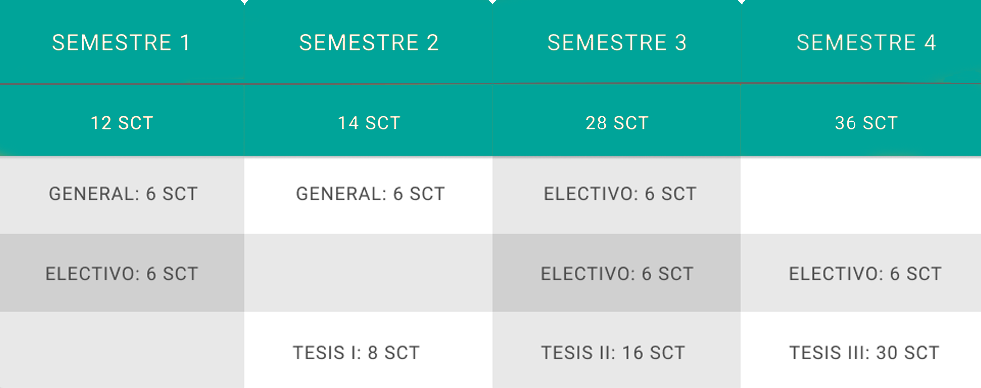Curriculum .
The curriculum consists of two general subjects and four electives, totaling 90 SCT, which support the thesis advance seminars and the final seminar. The general subjects provide a foundation in mathematics and physics, while the electives allow specialization in the thesis line of research. The thesis work is developed in three semesters, with two advance seminars to present the project and the state of the art, and a final seminar for the delivery and public defense of the thesis.

| Course | Credits |
|---|---|
| THESIS PROGRESS SEMINAR I | 8 SCT |
| THESIS PROGRESS SEMINAR II | 16 SCT |
| FINAL THESIS SEMINAR | 30 SCT |
| Course | Credits |
|---|---|
| MATHEMATICAL METHODS IN ENGINEERING | 6 SCT |
| NUMERICAL METHODS IN ENGINEERING | 6 SCT |
| CONTINUOUS MEDIA MECHANICS | 6 SCT |
| FLUID MECHANICS AND COMPUTATIONAL HEAT TRANSFER | 6 SCT |
| PROCESS MODELING AND SIMULATION | 6 SCT |
| MATHEMATICAL METHODS IN ENGINEERING | 6 SCT |
| FUNDAMENTALS OF THE FINITE ELEMENT METHOD | 6 SCT |
| Course | Credits |
|---|---|
| CONSTITUTIVE MODELS FOR METALS | 6 SCT |
| ANALYSIS AND SYNTHESIS OF MECHANISMS | 6 SCT |
| TURBULENT FLOWS | 6 SCT |
| HEAT CONDUCTION AND RADIATION | 6 SCT |
| HEAT CONVECTION | 6 SCT |
| NON-NEWTONIAN FLUIDS AND THEIR APPLICATIONS | 6 SCT |
| ANALYSIS OF STRUCTURES BY THE FINITE ELEMENT METHOD | 6 SCT |
| MODELING OF METAL SOLIDIFICATION PROCESSES | 6 SCT |
| FINITE ELEMENT METHOD APPLIED TO THERMOLUIDS PROBLEMS | 6 SCT |
| THERMAL METROLOGY AND INVERSE METHODS | 6 SCT |
| FRACTURE MECHANICS | 6 SCT |
| FINITE VOLUME METHOD | 6 SCT |
| COMPUTATIONAL FLUID MECHANICS WITH HEAT AND MASS TRANSFER: APPLIED CASES | 6 SCT |
| SPECIALIZATION TOPIC I | 6 SCT |
| SPECIALIZATION TOPIC II | 6 SCT |
| SPECIALIZATION TOPIC I | 6 SCT |
| SPECIALIZATION TOPIC I | 6 SCT |
Class Schedule
The program is taught from Monday to Friday from 8:00 a.m. to 6:40 p.m. and Saturday from 8:00 a.m. to 1:00 p.m.
Methodology
The teaching methodology is characterized by its theoretical and applied nature, oriented towards the analysis of specific cases and problem solving. In addition, it combines the delivery of content oriented towards the particular concerns of students in accordance with their research projects. Likewise, the development of skills necessary for academic production is incorporated through the review and analysis of scientific articles.
Evaluation System
The teaching methodology is characterized by its theoretical and applied nature, oriented towards the analysis of specific cases and problem solving. In addition, it combines the delivery of content oriented towards the particular concerns of students in accordance with their research projects. Likewise, the development of skills necessary for academic production is incorporated through the review and analysis of scientific articles.
Graduation System
Once the student has successfully passed all the subjects in his/her Work Plan, he/she may defend his/her Degree Thesis. The final presentation of the document will take place when the student has received the approval of the tutor.
To evaluate the document, a four-member committee will be formed, composed of the tutor professor and three correcting professors, one of them from outside the University. Each member of the correcting committee will issue and judge the thesis with their observations and final grade.
The requirements for obtaining a Master's degree are:
- Pass the Study Plan with a final grade point average of 5.0 or higher.
- Approve the Degree Thesis and Degree Examination.
As a result of the thesis work, the student must prove one of the following options: participation as a speaker at a conference, submission and acceptance for review of a manuscript to an indexed journal or participation, as an inventor, in the presentation of an application for a patent for an invention.
The student's final grade in the Program is obtained by considering: 50% grade for the Thesis work and 50% grade for the oral presentation of the Degree Exam. The grade is expressed according to the following table.
| Grades | Concept |
|---|---|
| Grades between 6.4 and 7.0 | Approved with Maximum Distinction |
| Grades between 5.7 and 6.3 | Passed with Distinction |
| Grades between 5.0 and 5.6 | Approved |
